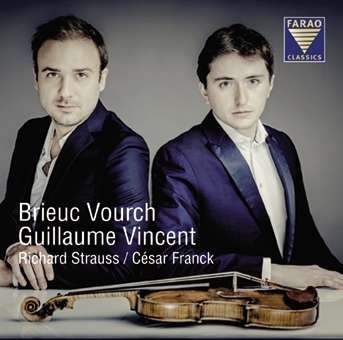Brieuc Vourch, the French classical violinist, speaks to us about the release of his latest CD with Guillaume Vincent and his upbringing amongst some of the world’s most recognised violin teachers in the musical field. We delve into details of the CD release and give our opinions on the sonata covers, as well as asking Vourch some interesting, and intriguing, questions.

The CD features 7 tracks of undeniably beautiful, classical music played on piano (Guillaume Vincent) and violin (Brieuc Vourch). It is relaxing to listen to, but also seems to meet the mood of whichever emotion you are experiencing at the time – a feature of a classical piece that is not possessed by many. I find that sitting down with any one of the songs playing sends me to a peaceful headspace where I can let my troubles go. It would be very difficult to press pause on any track on the CD once I had pressed play! I would highly recommend listening to this new release as soon as possible, and suggest every classical music lover out there with an appreciation for violin and piano music gives it a full listen. Vourch and Vincent’s CD is available on iTunes, or via purchasing on the following website – https://www.farao-classics.de/index.php?id=3&language=de&anchor=129#129.
We then spoke to Brieuc Vourch himself about how he is feeling regarding the brand-new CD, and his experience in the music industry.
Q: You have trained under many amazing violinists, including Itzhak Perlman and Boris Kuschnir. What was it like to develop your musical skills amongst so many influential people?
A: Good teachers must have tremendous pedagogical talent. They should have an eclectic education and, of course, be good psychologists. They should recognise and nurture talent and see where their students’ problems lie, and solve them quickly and in the correct order. I have been fortunate to have many outstanding teachers who answered my needs of education perfectly. I am currently following the guidance of Daniel Gaede. Daniel Gaede, an accomplished chamber musician, soloist, and former concertmaster of the Vienna Philharmonic Orchestra, is an extraordinary pedagogue. A great pedagogue helps you go faster in your comprehension of music and technical matters. It also gives you confidence and wisdom on the challenges you can face.
Q: What words of advice would you give to anyone, of any age, who wants to start learning an instrument?
A: They must develop not just instrumental abilities, but also play chamber music and the piano, read scores, go to the theatre and the opera, educate themselves eclectically. They should not just be healthy, but learn to play naturally and healthily. To be a great violinist, you should also be a good person and think positively.
Q: Your most recent CD release (July 16th) with the internationally recognised pianist Guillaume Vincent is an incredible performance of various sonatas and is a great CD choice for anyone in love with relaxing, beautiful music. What are your wishes with the release of this CD, and what messages do you want it to send to your audience?
A: We want people to forget us and immerse themselves in the souls of these works of art. If a listener listens to the CD feeling that he has heard incredible music, we will be satisfied.
We worked on these compositions meticulously, treating every phrase with great care and craftsmanship. For us, it was essential to bring as many colours, textures, and reliefs as possible out of these incredibly profound musical texts. We also enjoyed focusing a lot on the rhythm architectures of the works and how combined with subtle dynamics, we could well structure our musical speech.
“Safety and beauty are not compatible,” wrote the great conductor Nikolaus Harnoncourt. “When you seek beauty, you have to forget about safety and go to the edge of catastrophe. That is where beauty is found. If a musician makes a mistake, a crack, because he risks everything to get the most beautiful thing and fails, I thank him for that failure because only with that risk can you get beauty, true beauty. True beauty is not available at all. If you’re looking for security, you should do another job.”
Recording these sonatas, many of whose legendary performances have gone down in history, was a challenge for us. What more could we offer?
We pushed the limits, to the end of ourselves, in a radical quest for freedom and authenticity. To extract the substance of the composer’s writing, bring out the most intense original meaning of each harmony, approach the most remote sensitive dimensions, and allow ourselves to leave the concrete world to penetrate the infinite sound universe of Strauss and Franck, was our objective.
Q: I read that your violin is from the year 1690! How do you keep it in such good, playable condition?
A: My violin is under constant care. I clean it all the time and have it under professional supervision very regularly. The air of my studio is also very finely studied with the right amount of humidity to offer to such precious instrument the best conservation conditions.
Q: What are your ideal plans for the future regarding both your career, and your personal life?
A: I never thought of making a career. To me, it is a path that I discover every day. Music is a craft where I feel at ease, and that spoke to me immediately as a child. I do not disconnect it from my personal life. I hope to bring some happiness and joy to people around me.
Information on Brieuc Vourch can be found here: https://www.brieucvourch.com/
For more information about the latest CD, check out https://www.youtube.com/watch?v=N3HZ-GQwXf4
